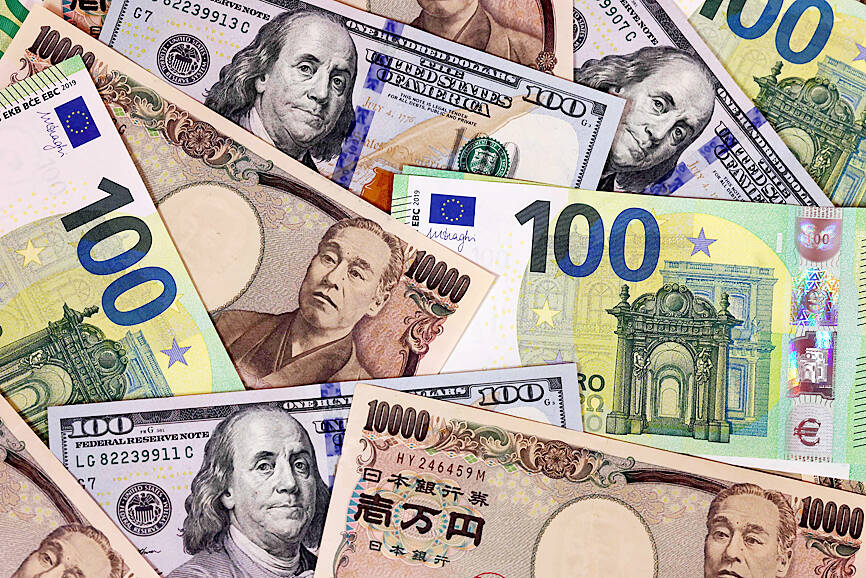The nation’s foreign exchange reserves last month grew US$1.97 billion to a record US$564.83 billion, as its assets denominated in European currencies gained value, the central bank said yesterday.
The US dollar index shed 1.36 percent in last month, while the euro advanced 1.63 percent, the British pound increased 1.87 percent, the Canadian dollar grew 2.94 percent and the Australian dollar rose 2.05 percent, Department of Foreign Exchange Director-General Eugene Tsai (蔡炯民) told in an online news conference.
The changes in value came after the US Federal Reserve kept its policy rate unchanged and other advanced countries raised interest rates to tame inflation, Tsai said.

Photo: AFP
By contrast, Asian currencies weakened against the US dollar, with the yuan losing 1.96 percent, the yen declining 3.44 percent, and the New Taiwan dollar depreciated 1.22 percent, Tsai said.
The central banks in Taiwan and Japan opted to maintain their monetary policy and China loosened lending terms a bit to support its economy, Tsai said.
Foreign fund flows played a neutral role after remitting US$3.43 billion of capital and wiring over US$3 billion of profit abroad, Tsai said.
The central bank largely refrained from intervention this year to help stabilize the foreign exchange market, except for a few times when it spotted abnormal massive fund movements, the official said.
As of Tuesday, the local currency dropped 1.31 percent against the US dollar, staying within a “stable” range, Tsai said.
The fund movements likely had to do with market expectations that the Fed would raise interest rates through September, in a continued bid to fight inflation, Tsai said.
Tsai declined to comment on the Fed’s potential moves except to say that the financial markets have reached the consensus that it would not cut interest rate this year and economic data would guide its policy decisions.

TRADE WAR: Tariffs should also apply to any goods that pass through the new Beijing-funded port in Chancay, Peru, an adviser to US president-elect Donald Trump said A veteran adviser to US president-elect Donald Trump is proposing that the 60 percent tariffs that Trump vowed to impose on Chinese goods also apply to goods from any country that pass through a new port that Beijing has built in Peru. The duties should apply to goods from China or countries in South America that pass through the new deep-water port Chancay, a town 60km north of Lima, said Mauricio Claver-Carone, an adviser to the Trump transition team who served as senior director for the western hemisphere on the White House National Security Council in his first administration. “Any product going

High above the sparkling surface of the Athens coastline, the cranes for building the 50-floor luxury tower centerpiece of Greece’s future “smart city” look out over the Saronic Gulf. At their feet, construction machinery stirs up dust. Its backers say the 8 billion euro (US$8.43 billion) project financed by private funds is a symbol of Greece’s renaissance after the years of financial stagnation that saw investors flee the country. However, critics see it more as a future “ghetto for the rich.” It is hard to imagine that 10km from the Acropolis, a new city “three times the size of Monaco”

STRUGGLING BUSINESS: South Korea’s biggest company and semiconductor manufacturer’s buyback fuels concerns that it could be missing out on the AI boom Samsung Electronics Co plans to buy back about 10 trillion won (US$7.2 billion) of its own stock over the next year, putting in motion one of the larger shareholder return programs in its history. South Korea’s biggest company would repurchase the stock in stages over the coming 12 months, it said in a regulatory filing on Friday. As a first step, it would buy back about 3 trillion won of paper starting today up until February next year, all of which it would cancel. The board would deliberate on how best to effect the remaining 7 trillion won of buybacks. The move

In a red box factory that stands out among the drab hills of the West Bank, Chat Cola’s employees race to quench Palestinians’ thirst for local products since the Gaza war erupted last year. With packaging reminiscent of Coca-Cola’s iconic red and white aluminum cans, Chat Cola has tapped into Palestinians’ desire to shun brands perceived as too supportive of Israel. “The demand for [Chat Cola] increased since the war began because of the boycott,” owner Fahed Arar said at the factory in the occupied West Bank town of Salfit. Julien, a restaurateur in the city of Ramallah further south,